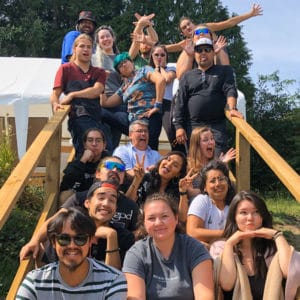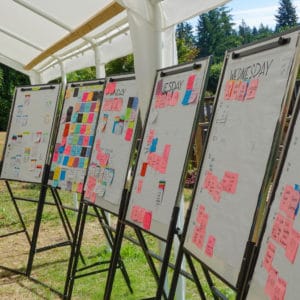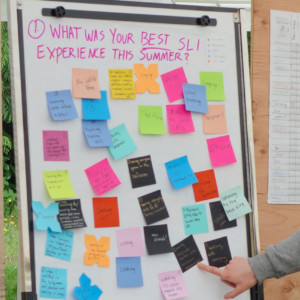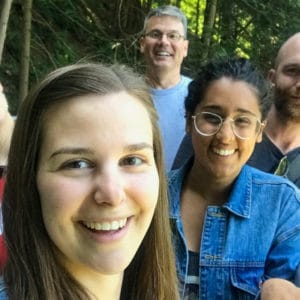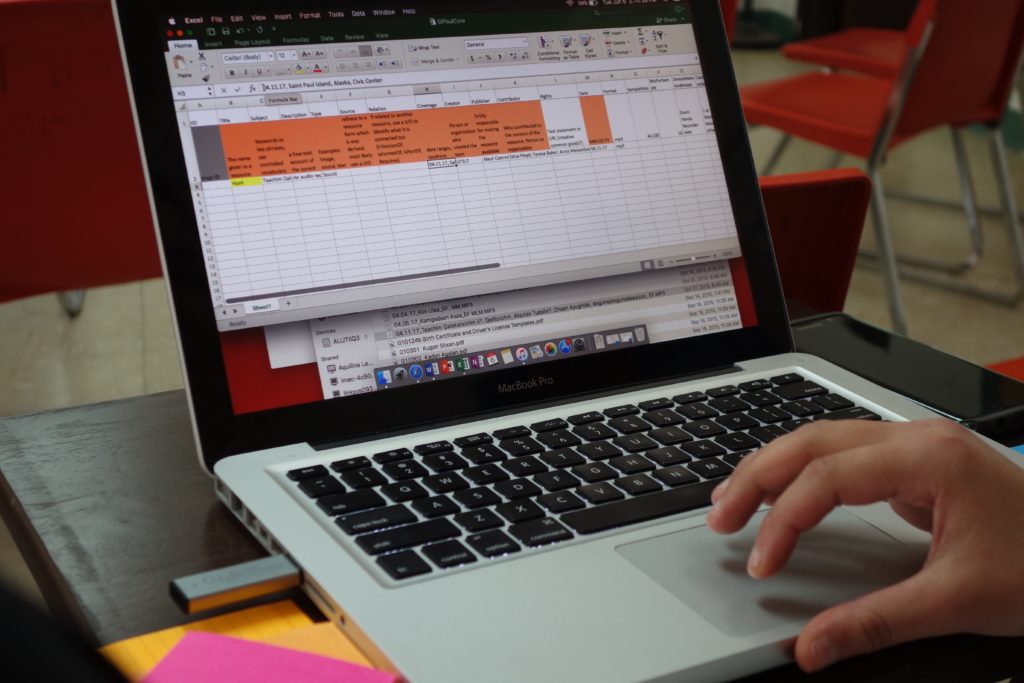
WAYK’s partnership with the Aleutian Pribilof Islands Association (APIA) is now in its third year. This summer WAYK is visiting the Unangam Tunuu Speaking Listening and Teaching (UTSLT) team on St. Paul Island to achieve its main goal: to help novice and intermediate speakers in the community expedite their language acquisition and hone their teaching skills, so that they can hand off the language to other community members. Throughout the partnership, the language learners in St. Paul have built an impressive collections of items: lessons, props, videos, and digital recordings that support Unangam Tunuu fluency. This summer, WAYK and St. Paul participated in an archiving training to hone the community’s cataloging skills. 10 young people of the UTSLT team sat around laptops with 8 WAYK “angels” answering the following question: how we can make our archiving efforts as accessible as possible?
When we think of archives and archiving, we generally think about untouched items properly organized by expert curators for the items’ preservation. We picture these items distributed into long rows, organized properly for the occasional individual, student and/or researcher to access with supervision. Within the typical archival process, community members provide items of significance (documents, cultural items, photographs, audio recordings) to an institution such as a museum or a library. Their involvement with the archiving process is complete once the items are collected. The archivists are regarded as the experts, and therefore guide and shape the archiving process. The archivists generally have little connection to the objects, and yet they are responsible for properly creating item descriptions for the catalog.
There is an episode from the TV show Friends that reminds me of the simple complications that can and have occurred when museums do not properly catalog documents, records, and sometimes cultural items from Indigenous peoples. Rachel, one of the main characters on Friends, decides that she would like to make the dessert for Thanksgiving dinner. She spends all day cooking an English Trifle from a recipe. She carefully follows the instructions, thoughtfully preparing each layer of the cake. Minutes before dinner, Ross discovers that two of the pages of the cookbook are stuck together. She has unknowingly cooked an English Trifle using ingredients from a Shepherd’s Pie.
Metaphorically, the pages stuck together in the cookbook remind me of a poorly constructed catalog. Generally, individuals who are not familiar with cooking, but wish to learn, like Rachel, trust recipes. We follow directions carefully, searching for each item required, hoping for yummy results. Similarly, first time visitors at an archive attempt to follow the directions of a catalog hoping to be lead to an item, photograph or audio. Historically, however, Indigenous peoples have not always been led to an item they are interested in due to poor archive management. Imagine visiting a museum, and following the instruction of a catalog to find a picture of your great great grandparent, but you are led to a picture of a seal.
What happens though when catalogs and archives are created by and cared for by the community?
10 young people from the UTSLT team participated in the three day archival training and were “angeled” by a professional archivist. When community members are treated as equal partners during an archival process by the archivist, the focus and results of an archive and catalog can be more relevant to the community. This is what I saw occur over the three day archival training.
Throughout this training, the needs of the UTSLT team were evaluated several times and action was taken to address any concerns and requests while creating a catalog. Overall, the three day training was a cyclical and dynamic process; each stage was constantly evaluated by all the participants involved, while ensuring that the UTSLT team’s concerns and requests were prioritized. Ultimately the UTSLT team and their community will be utilizing this catalog well into the future. We all hope that the hard work paid off, and no one will be left with a English Trifle with a Shepherd’s Pie twist!
Post authored by Talia.

